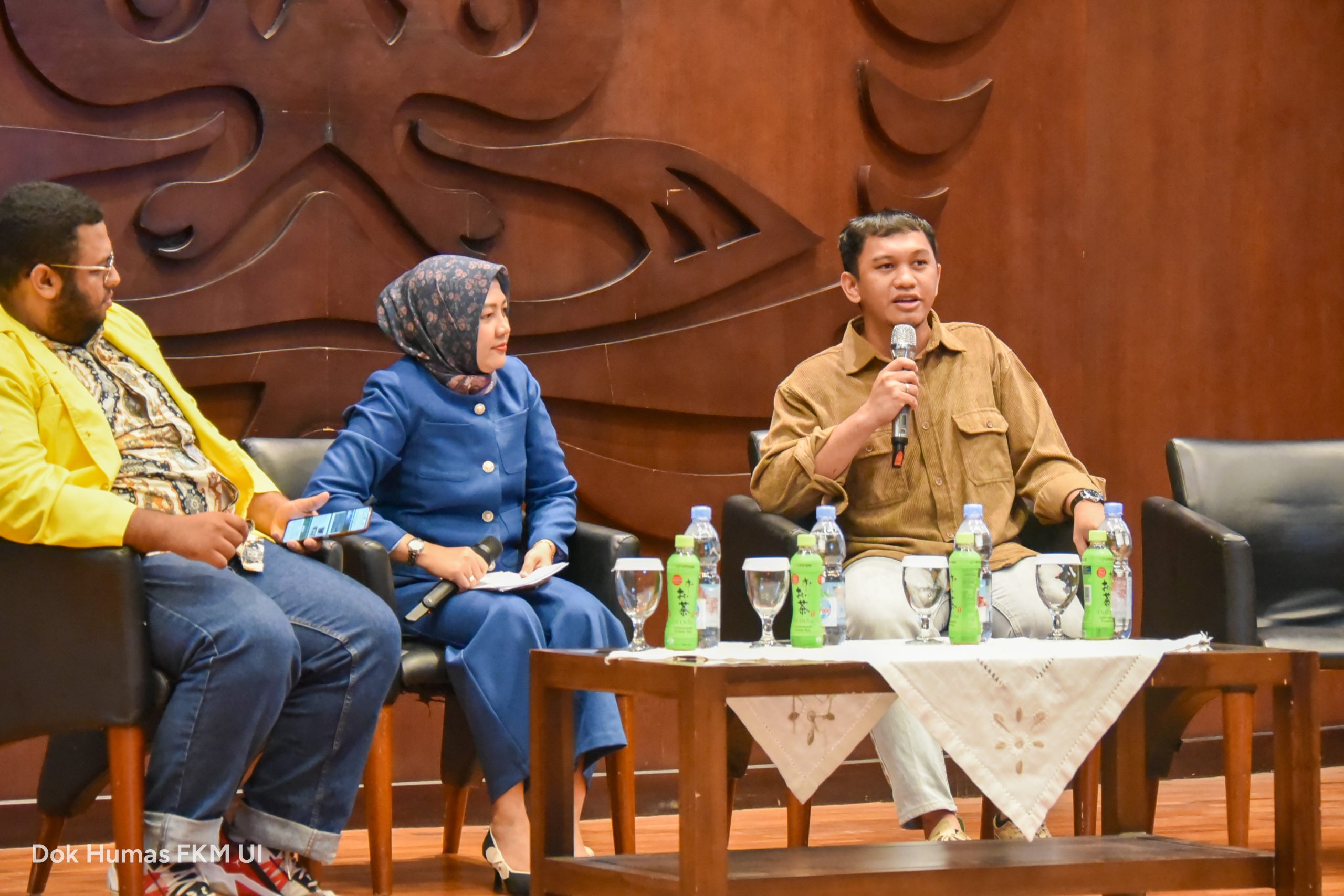Depok, October 4, 2025 — The Postgraduate Student Association (HMP) of the Faculty of Public Health (FPH) Universitas Indonesia (UI) successfully held the 2025 National Symposium with the theme “Healthy Environment, Equitable Access, Protected Generations” on Saturday (October 4, 2025) at the UI Convention Hall. This event served as a cross-sector forum bringing together students, academics, practitioners, and policymakers to discuss strategic issues in public health and environmental management. Through this forum, FPH UI reaffirmed its role as an academic platform that promotes collaboration and evidence-based policy advocacy to support equitable and sustainable health policies.
Initiated by the Department of Community Studies and Advocacy (Kadvomas) of HMP FPH UI, the event was attended by over 200 participants from various universities, professional organizations, and government agencies, both online and offline. In his opening remarks, Dien Anshari, S.Sos., M.Si., Ph.D., Manager of Student Affairs at FPH UI, expressed full support for the event. “Public health cannot be separated from environmental issues around us. Students play a crucial role in understanding, advocating, and driving change toward healthier and more sustainable communities,” he said.
The first session of the symposium addressed environmental issues and natural resource governance, featuring Ir. Sigit Eliantoro, M.Sc. (Deputy for Environmental Management and Sustainable Natural Resources), Aulia Furqon, S.Hut. (environmental activist), and Wafi Syukri Baraja, Head of Kadvomas HMP FPH UI. The speakers emphasized the importance of ecological justice and public participation in policy development. “A healthy environment is the foundation of social justice. Students hold a strategic position in ensuring that development policies do not compromise ecosystem balance,” said Aulia. Meanwhile, Ir. Sigit highlighted the necessity of synergy between academic research, government policy, and community advocacy as the key to participatory and transparent environmental governance. “We in the government highly appreciate this collaborative idea and continue to encourage multi-stakeholder collaboration so that environmental governance becomes more participatory and transparent. The synergy between policy, research, and community advocacy is the key to sustainable development,” he emphasized.
The discussion continued with public health policy issues, featuring Melliana Eka Cahyani, S.Tr.Gz., an academician and nutrition expert, who emphasized the importance of sugar taxes and color-coded labeling on sweetened food and beverages to encourage healthy consumption behaviors. In line with Melliana’s presentation, the student advocacy team of FPH UI also advocated for the enactment of sugar taxes and red–yellow–green labeling on sweetened products to reduce obesity and diabetes cases in Indonesia. “Consumers have the right to know the sugar content in the products they consume. Taxes and color labels are not restrictions but early prevention against non-communicable diseases,” explained Wafi.
The next session featured dr. Irwan Panva Wariaseno, M.K.M. from the Ministry of Health of the Republic of Indonesia, who discussed the expansion of HPV vaccine access for adolescent girls and vulnerable groups through community-based approaches. Prof. Dr. Ghufron Mukhti, M.Sc., Ph.D., CEO of BPJS Health, presented BPJS’s service transformation toward a more responsive and participant-oriented system, emphasizing the strengthening of primary care as the key to equitable access to national health services. “Strengthening primary care is the key to accessible services and achieving equity,” stressed Prof. Ghufron.
The event concluded with a call for cross-sector collaboration among the government, academia, and society. Muhammad Alfiansyah, S.K.M., Chair of HMP FPH UI, emphasized that the symposium was not merely a discussion forum but a tangible manifestation of students’ commitment to monitoring public health and environmental policies. “This symposium is an important momentum to strengthen synergy between students, the government, and the community. This is not the end of advocacy but the first step toward a healthier, fairer, and more sustainable Indonesia,” he stated.
Through the spirit of student collaboration and leadership, FPH UI, through HMP FPH UI, continues to commit to being a driving force for change in public health. (ITM)

